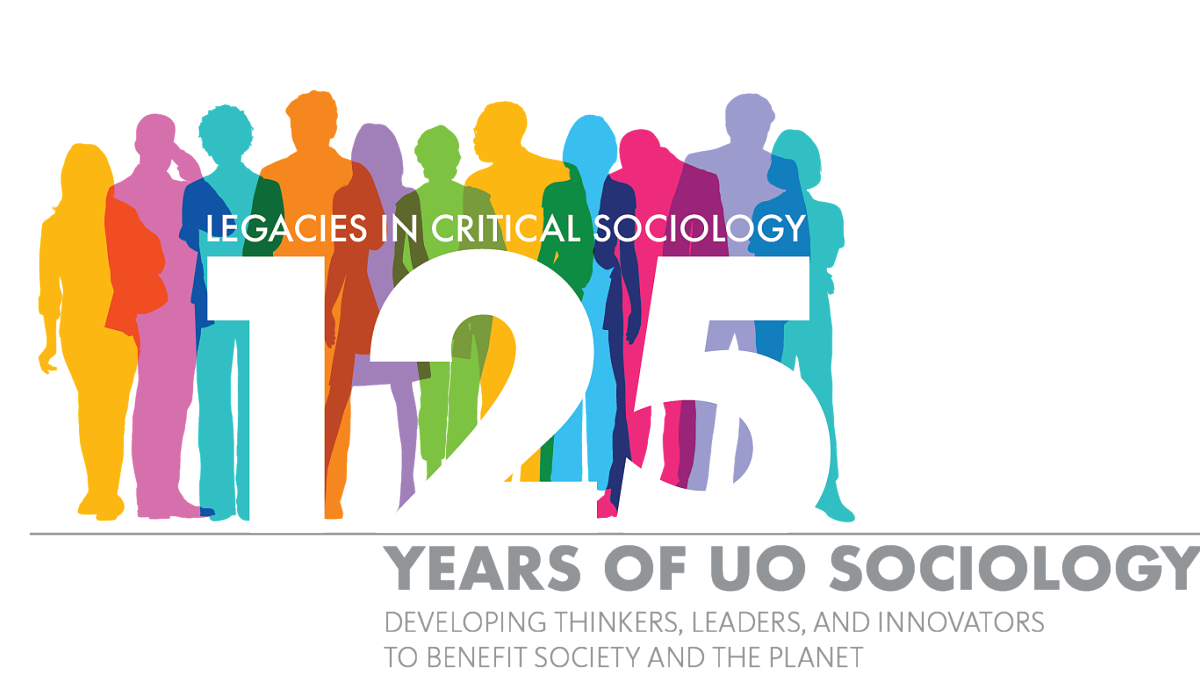
1894: Course 72 Sociology is first offered by Dr. Chapman, under the Political and Social Science course of study. The course is worth 1 credit.

Source: UO Archives, courtesy of UO Libraries
1895: Dr. Frederick Young teaches his first Sociology course at UO. Dr. Young was a professor of Economics and Sociology and would later serve as Dean of the Graduate School (1900-1920) and Dean of the School of Sociology (1919-1929). Dr. Young was also a founding member of the American Sociological Society (now the American Sociological Association ).
1919: The School of Sociology is founded at UO, thanks largely to the work of Dr. Young. Alongside an extension campus in Portland, the School focuses primarily on social work and social welfare activism. Both BA and MA degrees are offered.
1930: Facing Great Depression budget cuts, UO transfers a number of programs and faculty to Oregon State Agricultural College (now Oregon State University in Corvallis, OR). The School of Sociology is dissolved and replaced with the Department of Sociology within the College of Literature, Science, and the Arts.
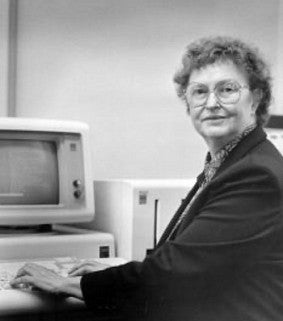
Dr. Fullerton became president in 1978, the first professor to rise to such rank at SJSU since 1900.
Source: The Mercury News, San Jose, CA
1954: The first PhD in Sociology at UO is jointly conferred upon Gail Fullerton and Snell Putney, who were married at the time. Both went on to become teaching faculty at San Jose State University, and Dr. Fullerton eventually became their first female president. Together they co-authored The Adjusted American.
1958: UO Sociologists begin serving as editors of the Pacific Sociological Review, now Sociological Perspectives , the journal of the Pacific Sociological Association. Today several faculty serve as advising editors , including Ryan Light , Jill Ann Harrison , Clare Evans, Eileen M. Otis, Ellen K. Scott, and professors emeriti Robert O'Brien and Jean Stockard.
1963: The Sociology department makes its initial move into Prince Lucien Campbell Hall (also known as PLC), occupying a number of basement and first floor offices. Today the department has "moved up" and is largely housed on the 6th and 7th floors of PLC (which did not yet exist at the time).
1967: The first female sociologist is appointed to the faculty, Dr. Joan Acker. Dr. Acker's expansive body of work would come to be considered a leading analysis of gender and class in second-wave feminism, and today she continues to be the second-most cited UO sociologist.
1970: In the wake of the protests and subsequent military violence at Kent State University, UO experiences a number of violent incidents including a bomb hurled into the first floor of PLC which destroyed several Sociology faculty offices. Despite an intense and controversial investigation by university leadership, local police and even the FBI, the perpetrator was never positively identified.
1970: UO Sociology awards 17 PhDs and creates a departmental record for graduating doctoral class size.
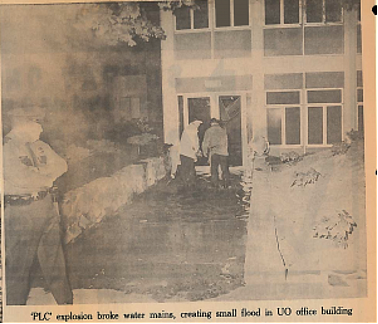
Source: Eugene Register-Guard, October 3, 1970
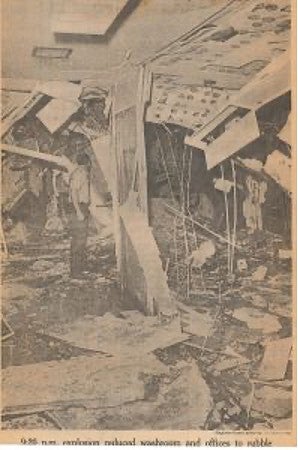
Source: Eugene Register-Guard, October 3, 1970
1971: Faculty in UO Sociology begin editing a volume known as The Insurgent Sociologist, which began two years earlier as a result of an uprising of the "Sociology Liberation Movement" at the 1969 ASA meetings. The journal was subsequently edited by UO Sociology faculty, including Professor Val Burris. Today the journal is titled Critical Sociology and is edited at Wayne State University in Michigan.
1972: Dr. Albert Szymanski, prominent scholar of Marxist theory and political economy of the USSR, joins the UO Sociology faculty; his arrival signaled the department's growing strength in Marxist sociology for which it is still known today.
1972: The Pacific Northwest Research Center is born in the basement of PLC, co-founded by two sociology graduate students, Stephen Johnson and Marvin Dunn. Other students collaborated in these early years, including future Pulitzer winner John Markoff, who would later write for the New York Times. Focusing on power structure research, the PNWRC collaborated closely with The Insurgent Sociologist and published work by Bill Domhoff, Peter Dreier, John Mollenkoph, and Beth Mintz. Faculty and graduate students carried this research into the 1980s.
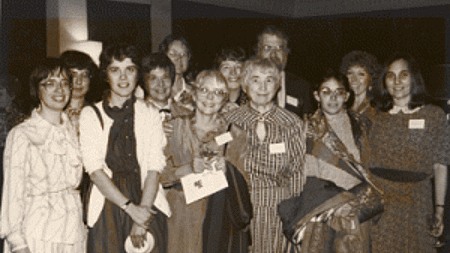
1972 : Dr. Joan Acker, along with several other UO feminist scholars, including Professor Miriam Johnson (Sociology), and with support from UO President Robert Clark, found the Center for the Sociological Study of Women (now known as the Center for the Study of Women in Society ). Today the center continues to support and produce feminist research on campus.
1976 : One of the oldest graduate employee unions in the country, the Graduate Teaching Fellows Federation (GTFF) , is founded. Early activists included several Sociology graduate students who worked with activists across campus to conceive of their union in PLC.
1977: Professor Steven Deutsch, along with professors Don Van Houten and Paul Goldman, builds a coalition at the University of Oregon and in Salem to found the Labor Education and Research Center . LERC's central missions are to support adult education of working class Oregonians, conduct research on critical issues impacting the economy, workplaces, and well-being of working Oregonians, and to provide strategic insights on the value and efficacy of labor unions.
1980: The Environmental Studies Program emerges from the Center of Environmental Studies, led largely by Richard Gale, the first environmental sociologist at UO. UO Sociology maintains a strong relationship with Environmental Studies, sharing jointly appointed faculty and dual-enrolled PhD candidates.
1989: Sociology, along with several other social science departments, contributes to the remodeling and revamping of the Social Science Instructional Laboratory (SSIL) on the first level of PLC. Originally opened on a National Science Foundation grant in 1979, the lab had "36 microcomputers, pictures, and fancy software, with a staff and half-time director." Today SSIL is still open in McKenzie Hall and is primarily used for advanced statistics analysis, access to Geographic Information Systems, and exam proctoring for online courses.
1992: Professor Patricia Gwartney founds the Oregon Survey Research Laboratory, which completed over 250 projects funded by about $8M in grants and contracts before closing in 2005. It is still the largest body of quantitative work attributed to a UO Sociologist.
2000: Professor John Bellamy Foster begins his twenty year service as the sixth editor for Monthly Review: an Independent Socialist Magazine . Professor Foster continues to lead the journal in 2020, sustaining a perspective, as Paul Sweezy suggested, of seeing “the present as history.” In 2006, MR began a daily web magazine, MRzine , which in 2017 was migrated to a new project, MR Online, a forum for collaboration and communication between radical activists, writers, and scholars around the world.
2001: Professor Mia Tuan works with a group of UO faculty, administrators, staff and students to found the Center for Diversity and Community (CoDAC) . Professor Tuan served as the founding director of this new center committed to advancing inclusive excellence through critical thinking and an ethic of care.
2009:Professor Emeritus and former Department Head Ben Johnson revises and expands on Dr. Walter Martin's history of the Sociology department in a new document titled "A Brief History of the Sociology Department at the University of Oregon."
2009: Professor Michael Dreiling works with faculty across campus to found a union to represent faculty at the University of Oregon, United Academics, Local 3209 AFT/AAUP . Professor Dreiling was elected as founding President and elected to two more terms President, also co-founding the American Association of University Professors, Oregon in 2013.
2010: 7450 undergraduate students take sociology courses during the academic year, a record high for the department.
2011: Professor Robert O’Brien and Professor James Elliott serve as co-editors for the journal of the Pacific Sociological Association, Sociological Perspectives , until 2015.
2012: 321 undergraduate degrees in Sociology are conferred during the academic year, the highest number ever for the department.
2016: Professor Patricia Gwartney elected President of the Pacific Sociological Association .
2019: Professors Ryan Light , Aaron Gullickson , and CJ Pascoe become co-editors for Socius: Sociological Research for a Dynamic World,the American Sociological Association’s only open access journal.
2020: The Department of Sociology celebrates its 125th anniversary and plans to host the 2020 Pacific Sociological Association conference in Eugene, OR. Those plans would be later put on pause in the wake of the COVID-19 worldwide outbreak.

